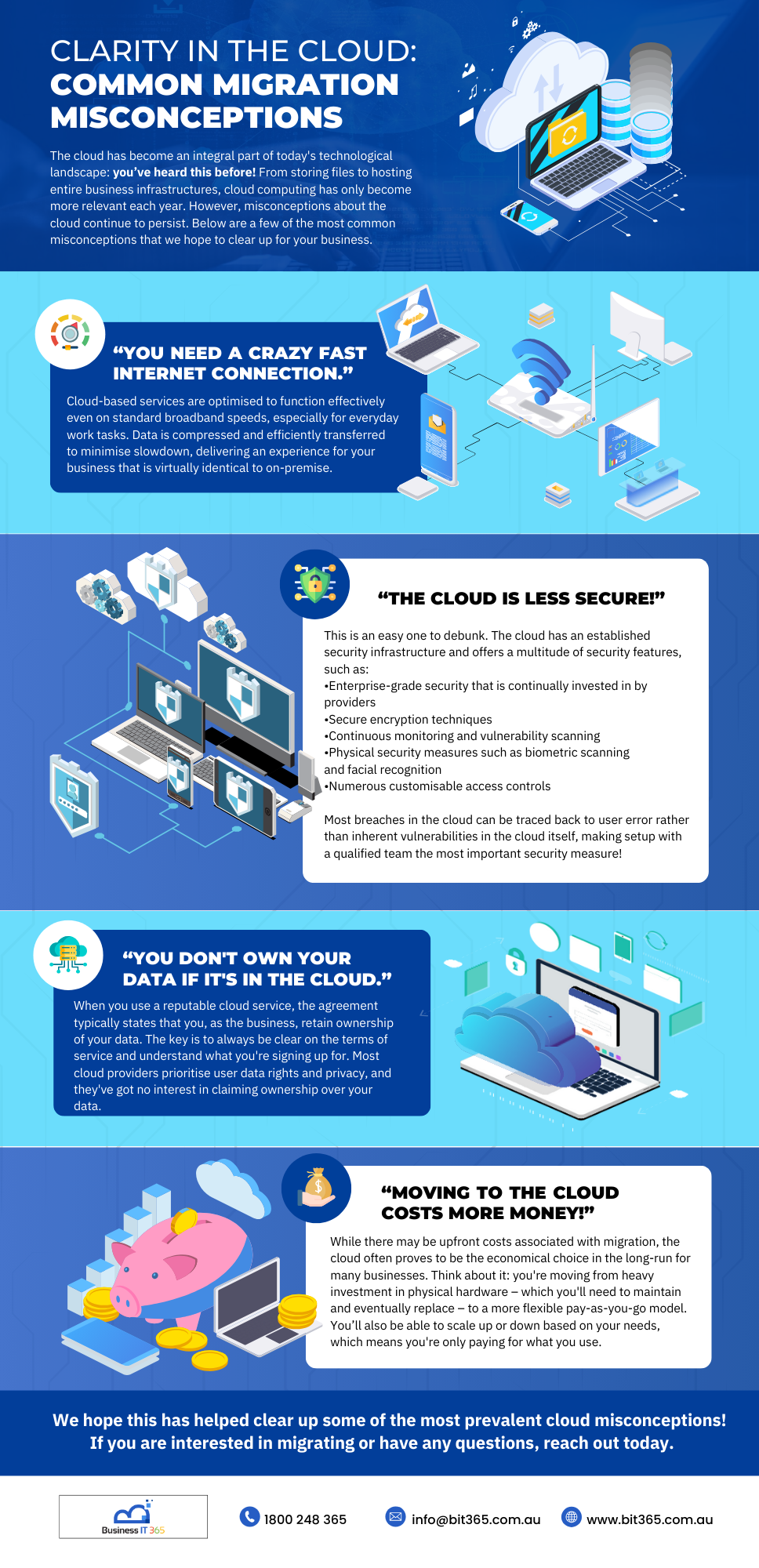
Got IT issues slowing you down? We provide both on-site and remote support across Australia, so help is never far away.
Cloud computing has rapidly transformed from a buzzword into an essential foundation for modern business operations. For many small and medium-sized businesses (SMBs) in Australia, the question is no longer whether to move to the cloud — but how to do it strategically.
While the benefits of the cloud are clear — flexibility, scalability, and efficiency — many business owners still hesitate due to cost concerns. What they often don’t realise is that the economics of the cloud can actually make it more affordable and sustainable than traditional on-premise systems.
This article explores the true cost-benefit equation of cloud computing, helping SMBs make informed, smarter IT investment decisions that balance performance with profitability.
Cloud computing changes the way businesses pay for technology. Instead of investing heavily upfront in hardware and infrastructure, companies shift to a pay-as-you-go model that aligns spending with usage.
This financial flexibility allows businesses to redirect capital from maintaining infrastructure to innovation and growth.
Let’s break down the major cost factors and benefits of cloud adoption.
Setting up traditional on-premise servers is expensive — from purchasing servers and cooling systems to managing storage and security. It’s like buying an entire restaurant when all you really need is a table.
With cloud computing, SMBs only pay for what they use. The provider manages the hardware, reducing upfront capital costs. Businesses avoid large purchases, depreciation, and maintenance fees.
The result? Lower initial expenses and predictable monthly operational costs.
Running physical servers often means late-night troubleshooting sessions, emergency replacements, and costly downtime. With cloud services, those responsibilities shift to the provider.
That means no more 3 a.m. calls when a server crashes — the cloud provider handles system updates, patches, and performance management.
This frees internal IT teams to focus on business innovation instead of firefighting.
Think of the cloud as an all-you-can-eat buffet where you only pay for what’s on your plate. As your business grows, you can scale resources up or down without buying new equipment or paying for idle servers.
This flexibility is particularly valuable for growing businesses, seasonal industries, or startups. You can add capacity for peak demand and scale back afterward — an option that’s impossible with traditional setups.
Running on-premise servers consumes substantial power — both for the hardware and cooling systems. Cloud providers, on the other hand, operate highly efficient data centres designed to optimise energy use.
By moving to the cloud, businesses reduce electricity costs and contribute to sustainability goals. In many cases, providers even use renewable energy sources, helping companies lower their carbon footprint while cutting costs.
Traditional data recovery can be complicated and expensive. Cloud computing simplifies this with built-in redundancy, regular backups, and disaster recovery plans.
If your system crashes or data is compromised, cloud recovery processes ensure quick restoration. This minimises downtime and reduces the financial impact of unexpected incidents — like cyberattacks or system failures.
Despite the many benefits, cloud computing isn’t completely free of financial surprises.
Some providers charge for data transfers, storage overages, or premium support. These hidden fees can add up if not managed carefully.
That’s why transparency and planning are key. Businesses should always review provider pricing models, read the fine print, and work with trusted advisors like BIT365 to build clear cost forecasts before migrating.
Moving to the cloud is more than a financial decision — it’s a strategic one. SMBs should follow a structured roadmap to ensure cost efficiency, performance, and security.
Step 1: Evaluate Your Current IT Environment
Review what systems you currently use, what workloads can migrate to the cloud, and what data needs to remain on-premise.
Step 2: Define Business Goals
Decide what you want from the cloud — cost savings, scalability, or better security — and prioritise accordingly.
Step 3: Choose the Right Provider
Not all providers are created equal. Consider reliability, security certifications, local data centres, and transparent pricing.
Step 4: Plan Migration Phases
Start small. Migrate non-critical systems first, test performance, then gradually move core operations.
Step 5: Monitor and Optimise
Continuously review usage and spending to ensure maximum value from your cloud investment.

Challenge 1: Sudden budget overruns due to unpredictable cloud billing
BIT365 Solution: We implement detailed cost monitoring dashboards and budget alerts so you always stay in control of your cloud spend.
Challenge 2: Confusion between multiple cloud providers and complex pricing models
BIT365 Solution: Our experts simplify cloud vendor selection, ensuring you choose the most cost-effective and transparent option for your business.
Challenge 3: Security concerns during cloud migration
BIT365 Solution: We use industry best practices for secure data transfer, identity management, and encryption to keep your business protected.
Challenge 4: Lack of in-house expertise to manage cloud operations
BIT365 Solution: BIT365 offers fully managed cloud services, acting as your virtual IT department for ongoing maintenance and support.
Challenge 5: Difficulty demonstrating ROI from cloud investments
BIT365 Solution: We align your IT strategy with business goals and provide measurable KPIs to track performance, savings, and growth.
🌐 Learn How to Spot Fake LinkedIn Sales Bots
🌐 Which Antivirus Is Best for Small Business
🌐 Navigating Cloud Service Providers: Making the Right Choice for Your Business
Whether you’re exploring cloud migration, trying to reduce IT costs, or need help choosing the right platform, BIT365 can guide you every step of the way.
We help Australian businesses implement cost-effective cloud solutions that balance performance, scalability, and security — so your technology grows with your business.
Got IT issues slowing you down? We provide both on-site and remote support across Australia, so help is never far away.
BIT365 offers a full range of managed IT services, including cybersecurity, cloud solutions, Microsoft 365 support, data backup, and on-site or remote tech support for businesses across Australia.
No. While we have a strong presence in Western Sydney, BIT365 supports businesses nationwide — delivering reliable IT solutions both remotely and on-site.
We pride ourselves on fast response times. With remote access tools and on-site technicians, BIT365 can often resolve issues the same day, keeping your business running smoothly.
BIT365 combines local expertise with enterprise-grade solutions. We’re proactive, not just reactive — preventing issues before they impact your business. Plus, our friendly team explains IT in plain English, so you always know what’s happening.
